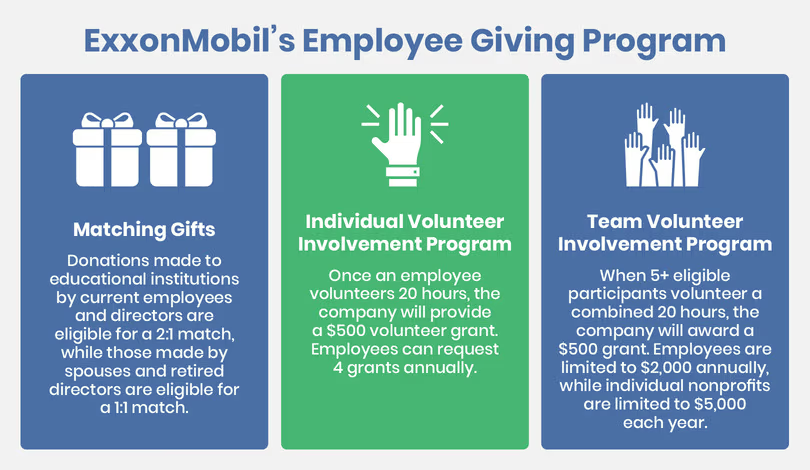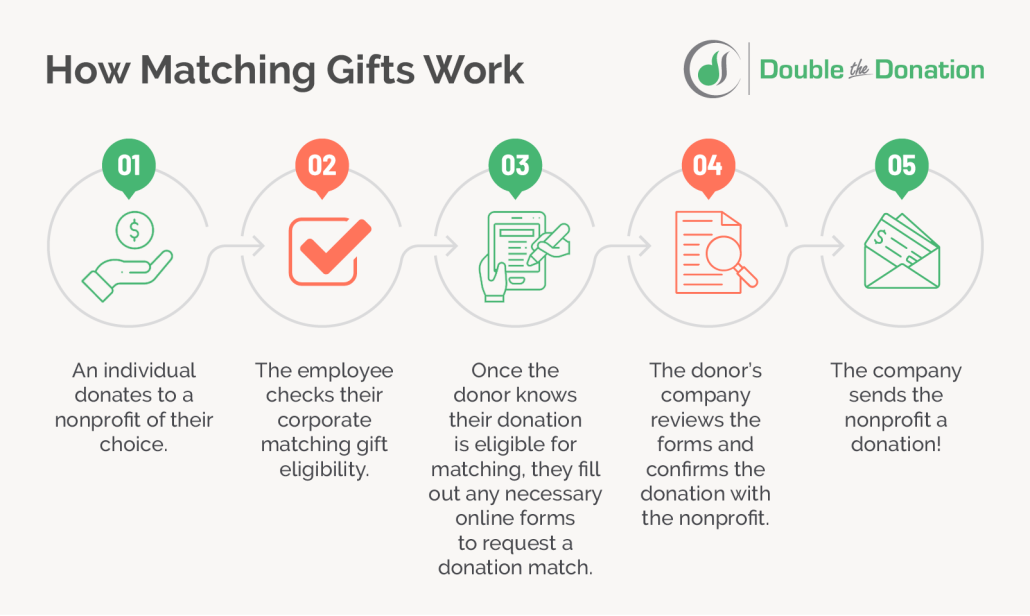How corporate philanthropy efforts drives neighborhood revitalization
Wiki Article
Checking Out Exactly How Company Philanthropy Shapes Brand Name Online Reputation and Customer Loyalty
Business philanthropy greatly affects brand name reputation and client loyalty. Firms that participate in authentic philanthropic efforts often see a positive change in exactly how customers perceive them. This placement of values promotes trust and emotional links with target markets. However, the effectiveness of these humanitarian efforts can vary greatly. Comprehending what genuinely resonates with consumers is essential for brands seeking to improve their social influence and market placement. What methods will arise as essential for future success?The Development of Corporate Philanthropy
As businesses progressively recognize their role in culture, the advancement of corporate philanthropy has actually changed from plain philanthropic donations to a critical part of brand identification. Business involved in philanthropy largely for tax advantages or to boost their public picture. Gradually, this approach changed as stakeholders-- consisting of consumers, workers, and investors-- required an extra authentic dedication to social responsibility.Organizations started straightening their kind efforts with their core worths and business purposes, bring about more impactful and thoughtful payments. This adjustment has urged companies to purchase sustainable practices and area development, promoting a feeling of purpose that reverberates with consumers.
Technical innovations have actually assisted in openness and involvement, allowing companies to showcase their philanthropic efforts a lot more effectively. Business philanthropy has actually arised as an indispensable part of business technique, with organizations accepting the possibility to positively influence culture while improving their total brand name narrative.
The Influence of Philanthropy on Brand Name Perception
While companies participate in kind efforts to advertise social good, these efforts greatly form brand perception amongst customers. Company philanthropy can improve a brand name's image by linking it with positive social impact and community participation. Consumers typically perceive brands that actively join charitable activities as more trustworthy and responsible. This perception can affect acquiring choices, as consumers might choose brands that demonstrate a commitment to social concerns.
Structure Emotional Links Via Offering
Business philanthropy acts as an effective device for improving brand identity by connecting business values with community needs. Through calculated giving, business can cultivate community interaction and create common worths that resonate with consumers on an emotional degree. This technique not just reinforces brand name reputation but likewise builds long lasting links in between organizations and their stakeholders.Enhancing Brand Name Identification
They not only contribute to societal great yet additionally build much deeper psychological links with their audiences when firms involve in kind efforts. By straightening their brand with philanthropic causes, companies boost their identification and signal worths that reverberate with customers. This alignment develops a story that surpasses solutions and items, inviting customers to participate in a common mission. As consumers significantly focus on purpose-driven brand names, companies that actively take part in giving can distinguish themselves in a crowded market. Such efforts promote a sense of commitment among clients who really feel personally attached to the brand name's values. Inevitably, corporate philanthropy becomes an essential tool for improving brand identification, growing long lasting relationships based upon shared beliefs and emotional engagement.Fostering Neighborhood Involvement
Countless research studies show that business taking part in community-focused kind campaigns can significantly enhance emotional links with their stakeholders. By purchasing neighborhood projects and supporting social reasons, companies cultivate a feeling of belonging and trust fund within the community. This interaction promotes a favorable brand image, as consumers value business that show authentic problem for societal problems. Moreover, employees frequently really feel a lot more motivated and happy to be connected with a company that focuses on area welfare. Because of this, customers are much more most likely to develop loyalty in the direction of brand names that actively add to significant causes. Inevitably, fostering neighborhood interaction with philanthropy not only enhances brand name track record however also develops lasting emotional ties that benefit both the area and the company it offers.Developing Shared Worths
Exactly how can companies effectively produce shared values that reverberate with their stakeholders? Companies can accomplish this by aligning their kind efforts with their core goal and the passions of their neighborhoods. By taking part in campaigns that address regional needs, businesses promote emotional links with customers, boosting brand name loyalty. Partnering with non-profits that mirror shared values reinforces the brand's picture and demonstrates commitment to social duty. Additionally, clear interaction regarding these initiatives allows stakeholders to see the concrete influence of their payments. Inevitably, by integrating shared worths into their corporate philanthropy, business not only improve their online reputations however also cultivate long-term connections with consumers, causing increased loyalty and trust fund. This alignment is important in contemporary customer decision-making.Situation Researches: Successful Philanthropic Campaigns
Taking a look at effective kind projects discloses different approaches that boost brand track record. Impactful area efforts, cutting-edge partnership designs, and lasting interaction techniques have actually confirmed effective in cultivating favorable connections with consumers. These study highlight the importance of thoughtful business offering in attaining both social and organization goals.Impactful Community Initiatives
Several business have efficiently leveraged kind campaigns to enhance their brand name online reputation while making a purposeful influence in their neighborhoods. As an example, a modern technology company launched a digital literacy program in underserved areas, providing training and resources that equipped regional residents. This campaign not only added to neighborhood advancement however additionally positioned the firm as a socially liable leader. Likewise, a significant food company executed a cravings relief campaign, partnering with local nonprofits to disperse dishes to households in requirement. This effort enhanced community ties and promoted client loyalty. Via these impactful efforts, companies have actually demonstrated their commitment to social responsibility, properly straightening their brand name values with the needs of the neighborhoods they serve, eventually boosting their general track record.Innovative Collaboration Versions
The success of impactful area efforts usually rests on ingenious partnership designs that bring with each other diverse stakeholders to deal with facility social obstacles. Study illustrate how firms, non-profits, and government entities can work together successfully. For example, a multinational firm partnered with a local charitable to release an education program, merging resources and experience to improve community literacy rates. An additional instance included a tech company and a health care company signing up with pressures to create a telemedicine service for underserved populations. These collaborations not only amplified the reach of philanthropic initiatives however also enhanced the brands' online reputations by aligning their missions with community demands. Ultimately, innovative partnership designs function as a catalyst for purposeful change and foster more powerful connections between brands and their consumers.Long-lasting Interaction Methods

Determining the ROI of Business Social Duty
As companies significantly spend in business social duty (CSR) efforts, comprehending the return on financial investment (ROI) related to these efforts comes to be important. Gauging ROI in CSR is complex, often including both quantitative and qualitative metrics. Economic returns can be examined through raised sales, boosted brand name loyalty, and improved worker spirits, which can lead to higher efficiency. In addition, firms may assess expense financial savings linked to lasting techniques, such as lowered waste or power intake.Qualitatively, the effect of CSR on brand name track record can be evaluated through consumer perception researches and social media sites view analysis. Studies can give understandings into how CSR tasks influence customer loyalty and count on. Additionally, benchmarking versus industry requirements can assist companies evaluate their CSR efficiency. Ultimately, a comprehensive technique to measuring ROI makes it possible for companies to make enlightened decisions about future CSR investments, lining up techniques with both financial performance and social effect
Consumer Assumptions and Company Obligation
Significantly, customers anticipate companies to run with a solid feeling of business obligation, seeing ethical practices as a prerequisite for brand commitment. This change in assumption reflects a growing recognition of environmental and social issues, leading clients to favor brands that line up with their values. Customers are more inclined to support firms that take part in transparent techniques, show sustainability, and add positively to their areas.Social media intensifies these expectations, permitting consumers to share their experiences and viewpoints rapidly. Brands that fall short to visit this page satisfy these moral standards run the risk of reaction, while those that welcome corporate duty often appreciate improved track record and customer loyalty. As customers demand accountability, companies have to integrate corporate social obligation into their core approaches, focusing on honest habits not equally as an advertising technique, yet as a basic facet of their operations. This positioning can eventually bring about stronger brand affinity and continual success in open markets.
Future Fads in Corporate Philanthropy and Brand Commitment
The landscape of business philanthropy is progressing, influenced by the heightened consumer assumptions bordering corporate duty. Firms are significantly integrating social effect right into their core service methods, not just as a supplementary activity. Future patterns show a shift towards openness, with brands sharing thorough information concerning their kind initiatives and their direct results on communities.Innovation is playing a vital function, making it possible for real-time engagement between consumers and brand names. Social media platforms help with direct communication, enabling consumers to voice their expectations and hold brands accountable. Additionally, younger generations, specifically Millennials and Gen Z, prioritize sustainability and ethical practices, driving companies to embrace more conscientious approaches.
As corporate philanthropy comes to be synonymous with brand name identification, business that authentically align their goals with societal demands are likely to cultivate more powerful customer loyalty. This convergence of worths will inevitably shape the future of corporate track record and consumer connections in a progressively diligent market.
Regularly Asked Concerns
How Do Consumers Learn about a Company's Philanthropic Initiatives?
Customers uncover a business's humanitarian initiatives through different networks, including social networks, news release, area occasions, and word-of-mouth. These avenues assist in understanding, making it possible for people to involve with brands that line up with their interests and worths.What Role Does Employee Involvement Play in Business Philanthropy?
Staff member involvement in corporate philanthropy enhances involvement, cultivates a feeling of possession, and strengthens team communication - corporate philanthropy. This participation commonly enhances the impact of philanthropic campaigns, leading to go to this web-site greater understanding and assistance for the business's philanthropic initiativesCan Corporate Philanthropy Backfire on a Brand name's Track record?
If regarded as opportunistic or insincere, company philanthropy can certainly backfire on a brand name's track record. Adverse public understanding may develop, bring about lessened trust fund and commitment amongst consumers that prioritize credibility in business actions.Are Smaller Companies as Efficient in Philanthropy as Larger Firms?
Smaller business can be similarly reliable in philanthropy as bigger corporations, frequently demonstrating dexterity and authenticity. Their localized efforts may resonate a lot more deeply with areas, fostering real links in spite of restricted resources contrasted to their bigger equivalents.How Can Business Choose the Right Triggers to Support?
Business can select the ideal bring on by straightening their worths with area requirements, analyzing stakeholder interests, and assessing potential effect. This tactical method promotes credibility, boosts interaction, and strengthens connections with customers and the wider neighborhood.While companies involve in philanthropic initiatives to advertise social good, these efforts considerably shape brand assumption among consumers. As consumers progressively prioritize purpose-driven brands, firms that proactively engage in providing can distinguish themselves in a crowded market. Several companies have successfully leveraged kind campaigns to enhance their brand name track record while making a purposeful effect in their communities. Significantly, customers expect firms to operate with a strong sense of company duty, seeing honest techniques as a requirement for brand name commitment. As company philanthropy ends up being synonymous with brand identification, firms that authentically straighten their missions with societal requirements are most likely to foster more powerful consumer loyalty.
Report this wiki page